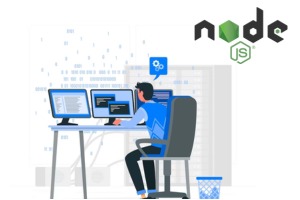Node.JS
Home » Course » Node.JS

Course Highlights
» Free Demo Class
» Real Time Experienced Trainers
» Affordable Cost
» Customize Course Curriculum
» Interview Preparaion Tips
» Complete Hands-on Real Time Training
Home » Course » Node.JS

» Free Demo Class
» Real Time Experienced Trainers
» Affordable Cost
» Customize Course Curriculum
» Interview Preparaion Tips
» Complete Hands-on Real Time Training
Node.js is an open-source, server-side JavaScript runtime environment that allows developers to execute JavaScript code outside of a web browser. It is built on the Chrome V8 JavaScript engine and provides an event-driven, non-blocking I/O model, making it lightweight and efficient for handling real-time, scalable, and data-intensive applications.
Key features of Node.js include:
Asynchronous Programming: Node.js uses a non-blocking, event-driven architecture, enabling developers to handle multiple concurrent operations efficiently without blocking the execution of other tasks.
JavaScript on the Server-Side: Node.js enables developers to use the same programming language (JavaScript) on both the client-side and server-side, making it easier to build full-stack applications.
Fast and Scalable: Node.js is known for its fast performance and scalability, making it suitable for building high-performance applications and handling a large number of concurrent connections.
NPM (Node Package Manager): Node.js comes with a powerful package manager called NPM, which allows developers to easily install, manage, and share reusable code packages.
Rich Ecosystem: Node.js has a vibrant ecosystem of modules and libraries available through NPM, making it easy to find and integrate third-party modules into applications.
Cross-Platform Compatibility: Node.js is compatible with multiple operating systems, including Windows, macOS, and Linux, providing flexibility for developers to deploy applications on different platforms.
Web Servers and APIs: Node.js is often used to create web servers and build RESTful APIs, making it popular for creating backend services in modern web applications.
Due to its features and advantages, Node.js has gained significant popularity among developers and is widely used for building real-time applications, web servers, APIs, microservices, and other server-side applications.
Node.js and Java are both popular technologies used for different purposes:
Node.js:
Java:
In summary, Node.js is specifically designed for server-side JavaScript development and is well-suited for real-time and data-intensive applications. Java, on the other hand, is a versatile programming language used for a wide range of applications, particularly in enterprise-level and large-scale systems. The choice between Node.js and Java depends on the specific project requirements, application type, and the expertise of the development team.
What are the advantages of NodeJS?
Advantages of Node.js:
Asynchronous and Non-blocking: Node.js uses an event-driven, non-blocking I/O model, enabling efficient handling of concurrent operations and scalable applications.
Single Language: Node.js allows developers to use JavaScript on both the client-side and server-side, streamlining development and code sharing.
Fast Performance: Node.js is built on the V8 JavaScript engine, providing fast execution and optimal performance for real-time applications.
Rich Ecosystem: Node.js has a vast ecosystem of open-source modules available through NPM, facilitating rapid development and easy integration of third-party libraries.
Scalability: Node.js is well-suited for building scalable applications due to its non-blocking I/O model and lightweight architecture.
Easy to Learn: Developers familiar with JavaScript can quickly transition to Node.js, reducing the learning curve for server-side development.
Real-time Applications: Node.js is ideal for building real-time applications like chat applications, gaming servers, and collaborative tools.
Active Community: Node.js has a large and active community, providing continuous support, updates, and a wealth of resources for developers.
Cross-Platform: Node.js applications can run on different operating systems, enhancing portability and flexibility.
Cost-Effective: Node.js allows developers to build efficient, high-performance applications with reduced server costs and hardware requirements.
Module 1: Introduction to Node.js
Module 2: JavaScript Refresher
Module 3: Node.js Modules and NPM
Module 4: File System and Streams
Module 5: Web Servers with Node.js
Module 6: Express.js Framework
Module 7: Asynchronous Programming in Node.js
Module 8: Data Persistence and Databases
Module 9: Authentication and Security
Module 10: Real-Time Applications with Socket.IO
Module 11: Web APIs and RESTful Services
Module 12: Unit Testing and Debugging
Module 13: Deployment and Performance Optimization
Module 14: Security Best Practices
Module 15: Introduction to Microservices (Optional)
Yes we will schedule a demo class as per the student convenient time by sharing live online streaming access either through Gotomeeting or Webex..
If you are enrolled in classes and you have paid fees, but want to cancel the registration for certain reason, it can be done within 48 hours of initial registration. Please make a note that refunds will be processed within 25 days of prior request.
Node.JS Rated 5.0 based on 1 reviews.
By: Nandini, Rating:
I can't speak highly enough about the Node.JS Online Training at BESTWAY Technologies. The trainers are experts who provide a deep understanding of Node.JS. The course content is thorough, and the practical projects are enlightening. I'm now Node.JS Developer, thanks to this training.